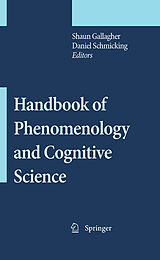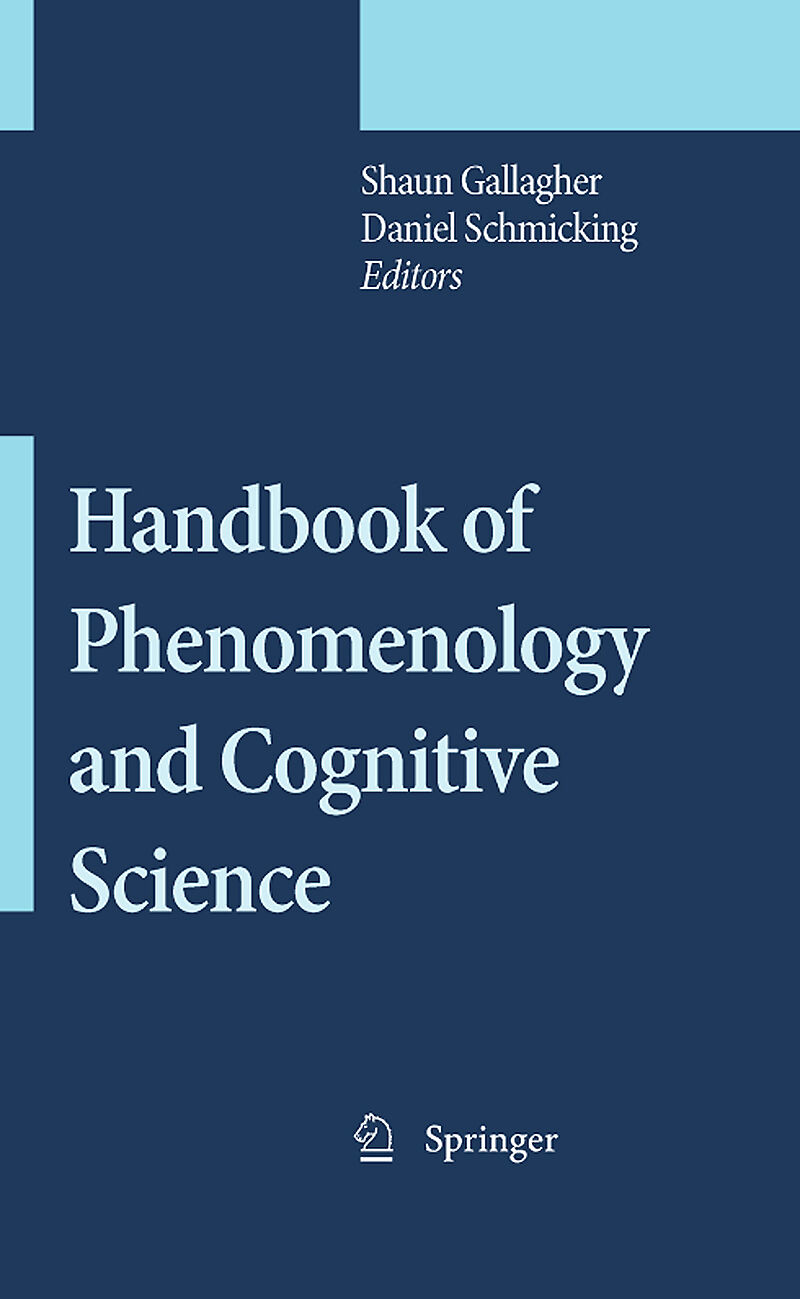Handbook of Phenomenology and Cognitive Science
Einband:
Fester Einband
EAN:
9789048126453
Untertitel:
Englisch
Herausgeber:
Springer Netherlands
Auflage:
2010
Anzahl Seiten:
700
Erscheinungsdatum:
18.12.2009
ISBN:
9048126452
The idea that phenomenology, in the European tradition, has something to offer the cognitive sciences is a recent development. Here, leading researchers address topics that lie at the intersection between phenomenological studies and the cognitive sciences.
This volume explores the essential issues involved in bringing phenomenology together with the cognitive sciences, and provides some examples of research located at the intersection of these disciplines. The topics addressed here cover a lot of ground, including questions about naturalizing phenomenology, the precise methods of phenomenology and how they can be used in the empirical cognitive sciences, specific analyses of perception, attention, emotion, imagination, embodied movement, action and agency, representation and cognition, inters- jectivity, language and metaphor. In addition there are chapters that focus on empirical experiments involving psychophysics, perception, and neuro- and psychopathologies. The idea that phenomenology, understood as a philosophical approach taken by thinkers like Husserl, Heidegger, Sartre, Merleau-Ponty, and others, can offer a positive contribution to the cognitive sciences is a relatively recent idea. Prior to the 1990s, phenomenology was employed in a critique of the first wave of cognitivist and computational approaches to the mind (see Dreyfus 1972). What some consider a second wave in cognitive science, with emphasis on connectionism and neuros- ence, opened up possibilities for phenomenological intervention in a more positive way, resulting in proposals like neurophenomenology (Varela 1996). Thus, bra- imaging technologies can turn to phenomenological insights to guide experimen- tion (see, e. g. , Jack and Roepstorff 2003; Gallagher and Zahavi 2008).
Offers an interdisciplinary perspective on the mind An international set of authors contribute the most recent thought on an important set of problems for science and philosophy Includes not only detailed analyses of the central topics in the philosophy and science of the mind, but also important explorations of psycho- and neuro-pathologies Provides clearly written chapters on methodological issues that address the question of naturalizing phenomenology, and the approaches of neurophenomenology and front-loaded phenomenology
Autorentext
Shaun Gallagher is Professor of Philosophy and Cognitive Sciences, and Senior Researcher at the Institute of Simulation and Training, at the University of Central Florida (USA); he has secondary research appointments at the University of Hertfordshire and the University of Copenhagen. He has been Visiting Scientist at the Cognition and Brain Sciences Unit, Cambridge, and Visiting Professor at the University of Copenhagen, the Centre de Recherche en Epistémelogie Appliquée (CREA), Paris, and the Ecole Normale Supériure, Lyon.
Klappentext
The Handbook of Phenomenology and Cognitive Science contains a comprehensive and authoritative overview of the main ideas and methods currently used at the intersection of phenomenology and the neuro- and cognitive sciences. The idea that phenomenology, in the European continental tradition, has something to offer to the cognitive sciences is a relatively recent development in our attempt to understand the mind. Here in one volume the leading researchers in this area address the central topics that define the intersection between phenomenological studies and the cognitive sciences. They address questions about methodology, the analysis of perception, memory, imagination, attention, emotion, intersubjectivity, the role of the body and language, and they explore a variety of pathologies that throw light on our everyday experiences. The authors draw on the classical works of phenomenologists such as Husserl, Heidegger, Merleau-Ponty, Gurwitsch, and Sartre, but they also push the traditional lines of phenomenology to new boundaries, mapping out new terrain in connection with the empirical science of the mind and body. These essays are revelatory for both phenomenologists who want to understand what cognitive science can contribute to an understanding of experience, and for scientists who want to understand how they can use phenomenology in their empirical studies.
Inhalt
Naturalized Phenomenology.- Phenomenology and Non-reductionist Cognitive Science.- A Toolbox of Phenomenological Methods.- Towards a Formalism for Expressing Structures of Consciousness.- Consciousness.- Attention in Context.- The Phenomenology and Neurobiology of Moods and Emotions.- Phenomenology, Imagination and Interdisciplinary Research.- The Function of Weak Phantasy in Perception and Thinking.- Myself with No Body? Body, Bodily-Consciousness and Self-consciousness.- A Husserlian, Neurophenomenologic Approach to Embodiment.- Body and Movement: Basic Dynamic Principles.- Empirical and Phenomenological Studies of Embodied Cognition.- The Problem of Other Minds.- Mutual Gaze and Intersubjectivity.- Knowing Other People's Mental States as if They Were One's Own.- Intersubjectivity, Cognition, and Language.- The Problem of Representation.- Action and Agency.- Meaning, World and the Second Person.- Husserl and Language.- Metaphor and Cognition.- Phenomenology and Cognitive Linguistics.- The Role of Phenomenology in Psychophysics.- A Neurophenomenological Study of Epileptic Seizure Anticipation.- How Unconscious is Subliminal Perception?.- IW - The Man Who Lost His Body.- Phenomenology and Psychopathology.- Delusional Atmosphere and Delusional Belief.- Autoscopy: Disrupted Self in Neuropsychiatric Disorders and Anomalous Conscious States.- Phenomenology as Description and as Explanation: The Case of Schizophrenia.- Agency with Impairments of Movement.

Leider konnten wir für diesen Artikel keine Preise ermitteln ...
billigbuch.ch sucht jetzt für Sie die besten Angebote ...
Die aktuellen Verkaufspreise von 6 Onlineshops werden in Realtime abgefragt.
Sie können das gewünschte Produkt anschliessend direkt beim Anbieter Ihrer Wahl bestellen.
Loading...
Die aktuellen Verkaufspreise von 6 Onlineshops werden in Realtime abgefragt.
Sie können das gewünschte Produkt anschliessend direkt beim Anbieter Ihrer Wahl bestellen.
| # | Onlineshop | Preis CHF | Versand CHF | Total CHF | ||
|---|---|---|---|---|---|---|
| 1 | Seller | 0.00 | 0.00 | 0.00 |
